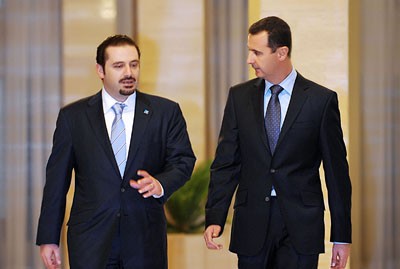
Hariri’s struggles in Lebanon show limits of U.S. influence
By Howard Schneider
BEIRUT — The victory by a pro-U.S. faction in last June’s parliamentary election has given way to a situation in which Hezbollah will keep its large arms stockpile and a veto over major government decisions, while efforts are underway to repair relations with neighboring Syria.
The compromises made by new prime minister Saad Hariri as he assembled a governing coalition are seen by supporters as unavoidable in a country where complex internal politics and the influence of outside powers can make governing difficult. But they also show the practical limits of the Obama administration’s overture to the Islamic world.
The June election victory by Hariri’s coalition came just after Obama delivered a major speech from Cairo and just before violent street demonstrations rattled the government in Iran, considered an important influence in Lebanon because of its support for Hezbollah. Some Obama advisers went so far as to attribute Hariri’s success to the mood of reform the president had brought to the region.
But victory at the polls did not translate so smoothly on the ground. Hariri spent six months trying to form a government and could do so only after accepting key Hezbollah demands and giving up on a main aim of his coalition: to curb the Islamist group’s influence.
He also agreed to visit Damascus and meet with Syrian President Bashar Assad, a difficult symbolic step because of Syria’s suspected involvement in the 2005 assassination of Hariri’s father, former prime minister Rafiq Hariri. A United Nations tribunal is still investigating the killing, one of a number of political assassinations that led to a U.N. resolution and other outside pressure, prompting Syria to end its longstanding military presence in Lebanon.
“We won the election, but it looks like we lost,” said Marwan Hamadeh, a member of parliament and supporter of the “Cedar Revolution,” which has aimed to curb the influence of both Syria and Iran in the country at a time when other power brokers, especially the United States, want to talk with both nations. “There has been a lot of realism and a lot of frustration. The Cedar Revolution forces were convinced: Why look for a fight when everyone is trying to negotiate with Iran and Syria?”
The shape of Hariri’s coalition is not seen by U.S. officials as a major setback; they view it instead as far preferable to a coalition dominated by Hezbollah and its allies. Hezbollah maintains a militia that it justifies as necessary for potential conflict with Israel, despite a U.N. resolution ordering the group to disarm. The United States regards Hezbollah as a terrorist organization. The group’s opponents in Lebanon argue that its arms stockpile puts the country at risk of another war, such as the one in 2006 in which Israel maintained that all of Lebanon would be held accountable for Hezbollah’s actions.
U.S. military and economic aid to Lebanon is continuing, largely to strengthen the Lebanese armed forces and other state institutions and undermine Hezbollah’s argument that the country can’t defend itself. The United States has contributed about $400 million to Lebanon’s military since 2006, a level expected to continue in the form of supplies that range from armored personnel carriers to new boots.
“It’s glass half empty, glass half full,” Sen. John McCain (R-Ariz.) said as he toured the country last week. “Does Hariri’s visit to Damascus mean you have to beg for Damascus’s dispensation, or does it mean that Bashar wants a new relationship? It remains to be seen.”
It is a question central to the discussion here and connected to U.S. efforts to turn Syria away from Iran, derail Iran’s nuclear program, and limit Iran’s influence through proxies like Hezbollah here and Hamas in the Gaza Strip.
Hariri’s visit to Damascus, according to his supporters and others, was brokered by Saudi Arabia, which has been taking its own steps to repair relations with Assad. What’s less clear — and under debate here — is whether the Saudis were hoping to weaken Syria’s long-standing alliance with Iran by making amends or hedging against the possibility that Obama will fail in his efforts to keep Iran from acquiring nuclear weapons technology.
The White House has its own policy of engagement with Syria, though progress has been fitful. The expected return of a U.S. ambassador to Damascus has not occurred, and there is still U.S. dissatisfaction with Syrian efforts to control its border and halt the flow of insurgents into Iraq.
Hariri’s meeting with Assad did produce some concessions, including an expectation that the countries would work more closely on defining borders and other issues that are considered a source of instability inside Lebanon and between Lebanon and Israel. Assad’s willingness over the last year to exchange ambassadors with Lebanon was also regarded by diplomats and analysts as an important acknowledgment of Lebanon’s sovereignty.
But there is still worry here that the momentum of the Cedar Revolution has been lost, and skepticism that U.S. efforts to engage Syria and Iran will change the behavior of either. The shape of the new government has only added to those concerns.
“Everybody is waiting to see if the Syrians will deliver, and if the Iranians win or lose their battle” both internally and with the United States, said Ghattas Khoury, a former member of parliament who is close to Hariri. “I think everyone reached the conclusion that these were not things you can do much about.”
Source: Washington Post

Leave a Reply
You must be logged in to post a comment.